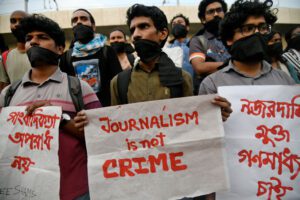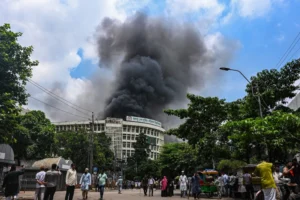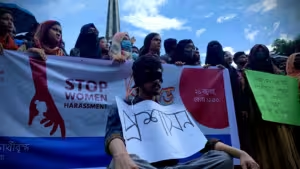Bangladesh is currently facing an intense wave of backlash from its workforce due to widespread reports of workplace harassment, leading to several casualties and internet blackouts. These reports, first heard of around June, have taken on a gendered harassment claim, spreading nationwide with allegations across the garments industry. During the situation, with the additional student protests demanding a quota reform and the resultant resignation of Prime Minister Sheikh Husna, the demonstrations have rapidly escalated, demanding focus upon rampant issues such as gendered discrimination and workplace regulations and rights.
The demonstrations have collided with the student protests demanding quota reforms, as women’s voices join in, drawing attention to the gendered harassment not uncommon in Bangladeshi society. The protests called to expose the unsafe conditions of workplaces, specifically for women and attempted to draw international eyes to the case. The demand for better reforms and safer working environments warrants proper legislation, far stricter enforcement, and safe spaces for awareness and complaints of the issues. Amidst the context of Bangladeshi society with its commonplace patriarchal structures of power, the anti-government protests insist strongly upon a change of systematic oppression.
Background and Case Details
The protests began in late June 2024, following a series of reports detailing severe harassment in the garment sector. Female workers have come forward with accounts of verbal abuse, physical intimidation, and sexual harassment by supervisors and male colleagues.
These incidents are not isolated; they reflect a pervasive culture of gendered violence and discrimination within the industry. This incident also reflects the overall patriarchally structured canopy of the South Asian region, a mindset that allows the normality associated with harassment.

Not only this, but journalists, specifically female journalists have been facing harassment for reporting the anti-government protests. Fabeha Monir claims a man emerged from the crowd and attacked her out of nowhere, calling the media reporting useless. This is relevant, also, to the case of Nadia Sharmeen, who was shot and injured by police gunfire on the ground when covering the protests. These actions against female journalists signify specifically structured patriarchal norms and symbolize the depth of discrimination faced by women in every field in the region.
What Is The Gendered Nature of Harassment
Workplace harassment involves any unwelcome behavior that creates a hostile work environment. Gendered harassment specifically targets individuals based on their gender and disproportionately affects women. In Bangladesh’s garment industry, this includes sexual harassment, such as unwanted advances and inappropriate comments, as well as physical and verbal abuse that undermines the dignity and safety of female workers,
thereby creating a working environment that feels and is unsafe for working conditions and does not meet any workplace standards.
Details of the Harassment Protests
The protests have been marked by large-scale participation from female garment workers, student activists, and civil society groups. Demonstrations have taken place across major cities, including Dhaka, Chittagong, and Gazipur, where garment factories are concentrated on a larger scale. Protesters have demanded stricter enforcement of harassment laws, the establishment of safe reporting mechanisms, and proper actions to be taken against perpetrators.

Reports from the ground indicate that the protests have often been met with heavy-handed responses from the authorities. Police have used tear gas, water cannons, and even live ammunition to disperse crowds, resulting in injuries and casualties among protesters. Despite this, the movement has continued to grow, drawing international attention and support from human rights organizations.
Regional and Legal Framework
Bangladesh has laws in place to prevent workplace harassment, including the High Court’s 2009 guidelines for the prevention of sexual harassment in workplaces and educational institutions. Despite these legal provisions, enforcement is weak, and this correlates back to the patriarchal structure in the society.
Many workers are unaware of their rights, and there is a lack of effective mechanisms to report and address harassment complaints. This gap in enforcement has left many women vulnerable to continuous abuse without adequate recourse or support, causing the dam to finally break and the streets to be flooded with protestors.
Statistical Context- Harassment Cases
Gender-based harassment and violence are significant issues in Bangladesh. According to a 2020 survey, nearly 60% of female garment workers reported experiencing some form of harassment. This high prevalence highlights the systemic nature of the issue.
In 2024, surveys on harassment against women in Bangladesh have revealed alarming statistics. A survey by the United Nations Development Programme (Bangladesh), the National Human Rights Commission, and the Centre for Research and Information found that 87% of women reported experiencing some form of harassment in their lives.
Including over 5,000 women across 24 districts, this survey highlighted that public transport is particularly unsafe, with 36% of women facing regular sexual harassment on buses, launches, trains, and at terminals. Additionally, 57% of respondents identified public transport as the most unsafe environment for women, contributing
Additionally, the garment sector, which employs over four million workers, mostly women, is crucial to Bangladesh’s economy, contributing to over 80% of the country’s export earnings. The scale and economic significance of the industry make the issue of harassment not just a social concern but also an economic one.
Connection to the Quota Reform Movement
Ongoing demands for quota reform in government jobs have bolstered the workplace harassment protests. While initially separate, the two movements have found common ground in their

fight against systemic injustice and inequality. The quota reform movement, led primarily by students, has highlighted issues of unfair job
allocations and lack of representation, resonating with the grievances of garment workers facing harassment, uniting on a front of the demand for better, and safer, working conditions.
Government and Industry Response
The government’s response to the protests has been mixed. While there have been promises of investigations and reforms, the aggressive crackdown on demonstrators has drawn criticism. The garment industry, too, has faced pressure to address the harassment issues more seriously. Some factories have started implementing stricter policies and training programs to prevent harassment, but these measures are often seen as insufficient when taken on a smaller scale without the complete addressal of the entire problem on a wider and complete scale.
International Reaction
The international community has expressed concern over the situation. Human rights organizations have called for urgent action to protect the rights of female workers in Bangladesh. Major international buyers of Bangladeshi garments have also been urged to ensure that their suppliers comply with ethical labor practices and provide safe working environments for their employees. The protestors have been able to garner attention on an international level, forcing the government to comply with demands and to scrutinize the inner-most level issues that have been ignored due to the weaponized normalization of patriarchal structures.
Say No To Harassment
The multi-layered demonstrations from both workers and students have exposed the internally hierarchical and discriminatory structures underlining Bangladeshi society. The demand, on a mass level, seems to call for better and more equitable environments, not just in workplaces but on a general level with a reformed Bangladesh. The structures of patriarchy and capitalism are being challenged by the intense protests, hoping for a better future for themselves and future generations of Bangladeshi workers, especially women.

For more information regarding Bangladesh’s human rights violation, see the UN’s recount regarding UNICEF reports 32 children killed, many injured and detained in Bangladesh protests
More Stories Like This:
Bangladesh PM Shiekh Hasina Resignation Sparks Unrest
UN concerns of human rights violations in Bangladesh
















